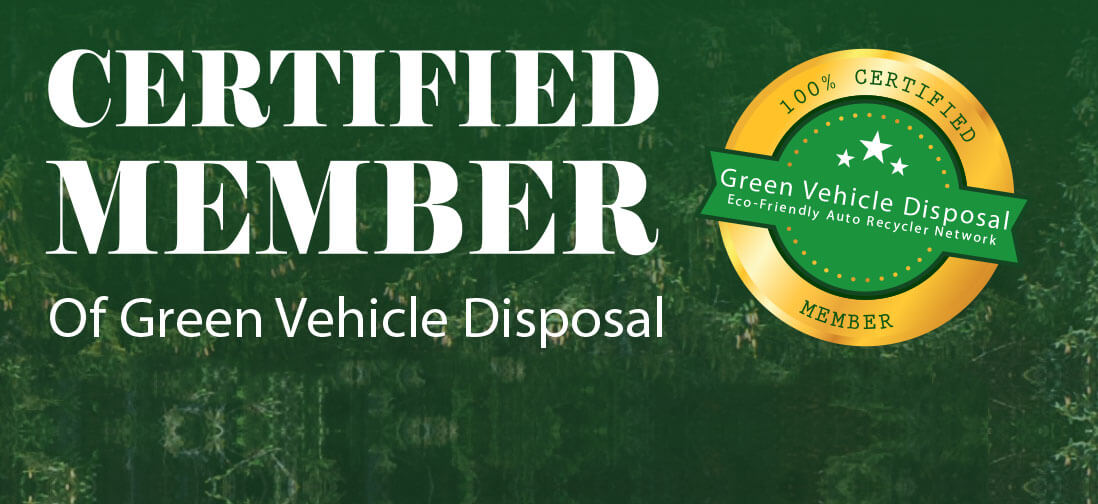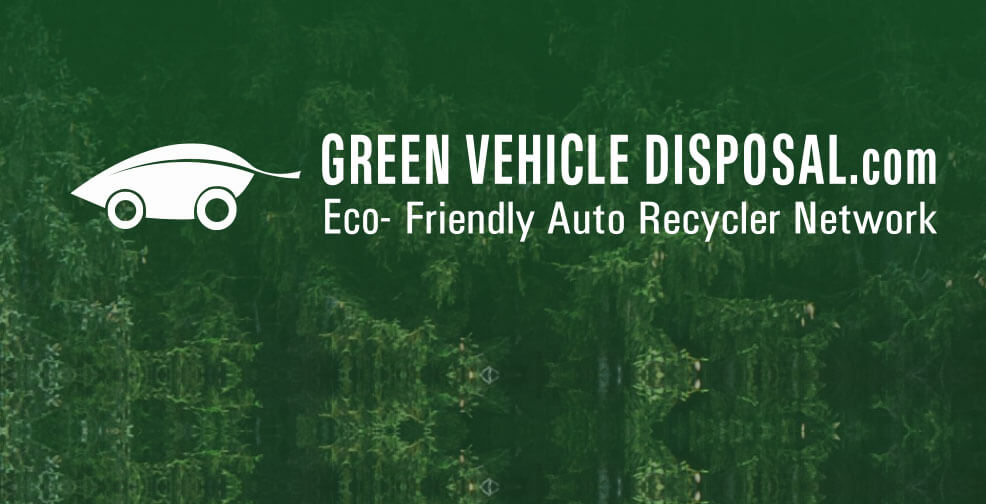1877EndOf LifeVehicles.com requires the following procedures be completed prior to becoming accredited Authorized Treatment Facilities (ATF’s):
- A completed 1877EndOf LifeVehicles.com application form.
- This must be sent, with registration fee and submittal requirements, to:
GreenVehicleDisposal.com
Canadian Corporate Office
1216 Sewells Road,
Toronto, Ontario, Canada M1X 1S1GreenVehicleDisposal.com
US Coporate Office
3800 Highland Avenue
Niagara Falls, New York, USA 14305Toll Free #: 1-877-End Of Life
- Once your application package has been received, our accreditation specialist will review the information given to ensure 1877EndOf LifeVehicles.com ‘s minimum required standards have been met. Any lack of adequate information will result in one of our accreditation specialists contacting you.
- Only once your package meets our requirements will your accredited status be approved. At this point, our
GreenVehicleDisposal.com Authorized Treatment Facility Director will contact you and our approved Affiliate Package will be forwarded to your site shortly thereafter.
For further clarification or information regarding this procedure you may e-mail us via helpdesk@GreenVehicleDisposal.com or call our Authorized Treatment Facility at 1-877-End Of Life and press 0 for the help desk.
Authorized Treatment Facility Application (ATF)
Please click on the link for the Application / Registration Form.
Authorized Treatment Facility (ATF) Standards:
Business Standards:
- Sufficient or paved customer parking area.
- A sterile and well-controlled sales facility and reception area.
- Descriptive yet friendly signage to facilitate customers maneuvering through your site.
- The maintenance of building and site reflects an organized and safe venture.
- Any company-owned tow trucks are well kept to ensure employee safety.
Environmental Standards:
- All fluids, such as gas, engine oil, transmission fluid, and antifreeze, must be adequately removed and stored before dismantling/crushing vehicles.
- All mentioned fluids are stored within a building or within some type of containment if outside.
- All batteries are removed from vehicles and stored in a covered area on impermeable ground or within covered plastic containers.
- All refrigerant is removed from vehicles (where applicable) by one of the following methods:
- R-12 recovery machine
- R-134a recovery machine Licensed removal vendor
- All engines and transmissions removed either for sale or as cores must be stored under an impermeable roof or outside within covered weather resistant containers.
- Tires removed are transferred to licensed disposal sites only.
Safety Standards:
- Must meet all local business standards.
- Any individual involved in the treatment of End Of Life Vehicles must use personal protective equipment such as gloves, hard hats, safety shoes, safety clothing, goggles and safety shields as required.
- Readily accessible eyewash stations.
- Readily available fire extinguishers (must be charged and ready for use).
- Spill Kits.
- Health and Safety specialists on site.
Licensing and Regulatory Standards:
- Must meet all local licensing and regulatory standards.
- Have current business licenses and permits.
- Is familiar with any applicable governmental legislated Environmental Standards.
IMPORTANT: Every individual member is responsible for their own compliance as to existing municipal/local, provincial/state, or federal regulations.
Authorized Treatment Facility (ATF) Submittals:
The following photographs are required by 1877EndOf LifeVehicles.com:
- The front of the main building (outside).
- The business sign (outside).
- Customer parking facilities.
- Retail facility.
- Customer waiting area.
- Signs in customer waiting area.
- Vehicle storage facility.
- Dismantling area(s) (include the draining area as well as dismantling area if alternate).
- Refrigerant recovery machine(s).
- Fluid storage areas, for gas/petrol, antifreeze, brake fluid, engine oil and transmission fluid.
- Battery storage area.
- Tire storage area.
- Personal safety equipment.
- First aid kit(s).
- Fire extinguisher.
- Spill kit(s).
Please mark all photographs with what they are supposed to be depicting.
The following photocopies are required by 1877EndOf LifeVehicles.com:
- Business license.
The required submittals are used for the purposes of 1877EndOf LifeVehicles.com only and will be kept on file for as long as your business remains an affiliate.
Authorized Treatment Facility (ATF) Regulations:
All current or potential Authorized Treatment Facilities must adhere to the following:
- The outlined guidelines/regulations met by the agreed upon date.
- When collecting an End of Life Vehicle, a Certificate of Destruction or Deregistration must be issued to the last holder of that vehicle.
For all vehicles that require de-pollution and are to be treated at Authorized Treatment Facilities, all potential candidates will be subject by 1877EndOf LifeVehicles.com to the following:
- Credit checks to make sure affiliate is financially firm.
- Background check to make sure affiliate has no prior relevant convictions.
- Employs a technically competent staff to see to the day-to-day operation of the facility.
The regulations on the storage of end of life vehicles:
These regulations stipulate the environmental standards as required by 1877EndOf LifeVehicles.com. We maintain the right and responsibility to randomly check any 1877EndOf LifeVehicles.com‘s affiliated Authorized Treatment Facilities (ATF’s), although it is the ultimate responsibility of the Authorized Treatment Facility itself to make sure they operate under the regulations provided.
For the appropriate management of end of life vehicles to occur, member Authorized Treatment Facilities must meet the values as outlined by 1877EndOf LifeVehicles.com with respect to the storage, de-pollution, dismantling of end of life vehicles as well as Customer Service objectives.
These regulations apply to all cars and light goods vehicles as well as heavy goods vehicles as well as motorcycles also. No matter what the size of vehicle, they all have the same pollution potential.
Regulations applicable to all sites involved in the handling of end of life vehicles:
- Authorized Treatment Facilities must provide adequate surfaces for their sites. These areas must have the necessary spillage collection amenities, containers and cleansers.
- Those vehicles that have not yet undergone extensive process of de-pollution, remain dangerous and are considered hazardous waste.
- If any evidence surfaces that indicate current practices are contributing to the pollution of that area, it must serve as an indication that such practices are insufficient and require immediate reassessment.
Impermeable Surfaces:
A surface will be deemed unacceptable if it is permeable, in those areas where de-pollution is taking place. The following constitute an unacceptable surface:
- If it is made up exclusively of hard standing (crushed/broken bricks as well as other types of accumulated materials).
- If the slabs and/or paving is not properly joined/sealed.
- Any type of spillage or surface water will not be contained within the system; this includes fluid such as battery acids etc.
- It is made of a material where harsh physical activity is likely to damage the environment.
Spillage Collection:
Impermeable surfaces are to facilitate as the primary means to achieve the containment of spillage. Nevertheless, the implementation of spillage kits to deal with spills as they arise is necessary.
Regulations for sites treating End of Life Vehicles:
All necessary steps must be taken to ensure the safe and precautionary measures are taken to bring about the proper treatment of end of life vehicles.
- Appropriate storage for End Of Life Vehicles as well as the parts removed from End Of Life Vehicles.
- Batteries must be removed from End Of Life Vehicles and placed in containers set aside for batteries exclusively.
- All containers used must be secure to ensure fluids cannot escape.
Removal and Storage of fluids:
1877EndOf LifeVehicles.com requires the removal and separate collection of vehicle fluids. These include: gas, engine oil, transmission oil, antifreeze, refrigerants, etc.
Our objective is to facilitate the reuse, recycling and recovery of waste fluids thereby minimizing the overall impact of these fluids on the environment.
It is important to note that End Of Life Vehicles that have not been de-polluted are classified as hazardous waste. The proper treatment of End Of Life Vehicles is necessary to adhering to all applicable health and safety regulations.
With reference to storage containers, these containers must come equipped with a secondary storage system in case the primary unit fails.
Tires:
1877EndOf LifeVehicles.com requires the apt storage of tires, which must take into account fire preventative measures.
Stockpiling of tires produces a safety hazard and must be avoided.
Ozone Depleting Materials:
Any End Of Life Vehicle containing Ozone depleting agents (such as CFC’s), must have such fluids removed for recycling or disposal.
Your local environment legislation should outline this process as unique to your respective area.
Mercury:
All vehicle components containing Mercury must be recovered and disposed of accordingly. Information provided by vehicle manufacturers will greatly aid with he recovery of this substance.
***1877EndOf LifeVehicles.com does not permit the burning of waste***



